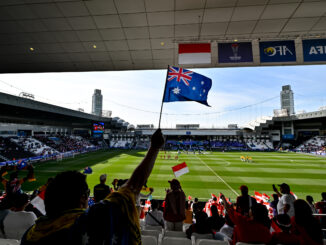
The press release that dropped from the Asian Football Confederation last Wednesday evening seemed harmless enough.
The formation of another Task Force – doesn’t football love a Task Force – to examine ways, to quote the AFC President, Shaikh Salman, himself: “…in which we can transform our Elite Club Football into a more attractive stage to improve technical performance, drive commercial value and excite investors to elevate our club competitions to the next level.
“We are always looking to improve what we have, and we must make strategic and bold changes to elevate the status of our elite club competition.”
Four member associations from the East (Japan, South Korea, China and Australia) and four from the West (UAE, Qatar, Saudi Arabia and Uzbekistan) would form the Task Force to report back to the AFC Executive Committee in the coming months with their recommendations.
So harmless did it seem that it basically went by without mention – until the real story came out.
First breaking on social media, the news seemed so unbelievable that at first it was easy to dismiss as just a misunderstanding of the AFC’s press release. But it wasn’t the case.
Lurking behind the Task Force facade was something more sinister; a proposal and push for an Asian Super League.
After the disastrous attempt by the cabal of European clubs to force through their own Super League last year, the mere mention of those two words is enough to make any fan shudder.
Such a proposal has always been bubbling away just underneath the surface, but is one that has never really been acted upon. And after the swift and embarrassing capitulation and collapse to the proposed European Super League, it was assumed the idea of a Super League, anywhere in the world, was dead and buried for the foreseeable future.
After all, who would be brave enough to suggest such an unpopular move?
But, apparently not and proposed it was. Not by any of the AFC’s member associations but, from my understanding, from the AFC’s media rights partner, Football Marketing Asia, who have not been shy about their ambitions to shake up the existing structures of Asian continental football.
With the proposal, I am told, not receiving strong support from senior AFC officials the establishment of a Task Force to at least examine not only that proposal, but other potential measures, was the happy medium.
First of all it needs to be said that discussing football matters and the structure of AFC’s club competitions is absolutely the right thing, and long overdue.
These are the discussions we should be having, but ones that don’t happen enough in Asian football. They do at a micro level in individual countries, but at a macro level they are rare. We need more of it.
We should always be looking at ways we can improve and evolve what we have. To that respect, Salman is correct.
The problem in Asian football is we rarely have these discussions, about purely football matters, in an open and transparent way. Ideas, even unpopular ones, aren’t floated, discussed and debated. They’re just announced by press release.
At the height of the Super League war in Europe, we heard plenty from UEFA president Alexander Ceferin and his objections to the proposed breakaway league. In fact, we often hear from the Slovenian on matters of football and on issues that are important to European football. He is, to a degree, open to media interviews and sharing his views.
When was the last time you heard from Salman or any of the AFC power-brokers about anything, not least footballing matters as they relate to Asia? The best we get are overly scripted media releases from the President ‘hailing’ any number of things.
So I welcome this new Task Force and its exploration of the structures of continental football, even if it will almost certainly take place behind closed doors with decisions made, announced and actioned without a word from those charged with making the decisions.
Are the AFC Champions League and AFC Cup as they’re currently structured achieving their maximum potential and delivering the best outcomes for Asian football? You’d struggle to find anyone who thinks that that they are.
So we should absolutely explore how they can be tweaked and changed to ensure they deliver on the unlocked potential they have and how they can deliver better returns for all parties.
It must also be said that the expansion to 40 teams of the AFC Champions League, a move that has its detractors, has yet to exist in its intended state. Both tournaments under the expanded format have been held during COVID, with locked international borders, and in centralised hubs, often with crowds barred from attending.
You could hold a proposed Super League in such sterile environment and you’d be left with the same empty feeling.
The expanded tournament needs to be given a chance to breathe and a chance to exist in its desired home and away format before we can properly judge whether it works. The whole idea behind the expansion was to take in more markets, especially the bigger ones in India and Southeast Asia – markets that can bring more eyeballs, more interest and more fans to drive the very things the proposed Super League is intended to – commercial value and technical performance.
But while these are the discussions we should be having, the outcome must not be a Super League, in whatever guise.
Any league or tournament that seeks to ring fence the so-called elite clubs or countries does a disservice to Asian football. It’s easy to see why it might be popular to sponsors, but again that’s if you apply a European lens to the matter.
Is a match between Al Hilal and Al Sadd going to appeal to a fan in Jakarta or Seoul? Equally a match between Kawasaki and Jeonbuk is unlikely to appeal to a fan in Dubai or Doha.
Asia is, for better or worse, a deeply segregated and provincial continent and changing that is the AFC’s greatest challenge. Is that achieved through a Super League? I would say that’s unlikely.
The only good thing about the leak of the proposed Super League is that it’s now on the table. We know it’s being floated, we know it’s being discussed and we know it’s not entirely popular – especially with the fans.
A harmless press release now carries so much extra significance for the future of Asian football. We will be watching and we will be waiting. In the meantime it’s incumbent upon every fan of Asian football to voice their opinion and have this discussion.
It’s one we desperately need to have.
Photo: Asian Football Confederation




